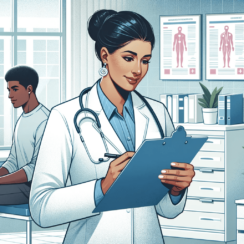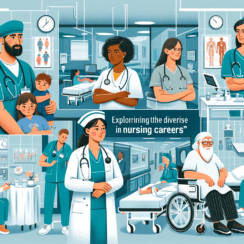Resume Basics for Nurses

Resume Basics for Nurses
Your nursing resume is your first opportunity to make a positive impression on potential employers. It serves as a crucial tool for showcasing your skills, experience, and qualifications in the competitive healthcare job market. In this section, we'll explore the fundamental components of a nursing resume and provide essential tips for creating a compelling document.Components of a Nursing Resume
A well-structured nursing resume typically includes the following components:- Contact Information: Start with your full name, phone number, email address, and location (city and state).
- Summary or Objective Statement: A brief opening statement that highlights your career goals and what you bring to the table as a nurse.
- Skills Section: Showcase your nursing skills, including both clinical and soft skills relevant to the role.
- Work Experience: Detail your relevant nursing work experience, including job titles, employers, dates of employment, and key responsibilities.
- Education: List your nursing degrees, schools attended, graduation dates, and any academic honors or awards.
- Certifications and Licenses: Highlight your nursing certifications and state licenses, including expiration dates.
Tips for Formatting and Organization
Formatting and organization are crucial for readability and ensuring that your resume effectively communicates your qualifications:- Use a clean and professional resume template.
- Keep your resume concise, ideally within one page, unless you have extensive experience.
- Use clear headings and bullet points for easy scanning.
- Tailor your resume for each job application by emphasizing relevant skills and experience.
Crafting a Strong Summary or Objective Statement
Your nursing resume's introduction is your chance to make a memorable first impression on hiring managers. A well-crafted summary or objective statement can immediately grab their attention and convey your career goals and qualifications. In this section, we'll explore the significance of this opening statement and provide examples tailored to different nursing roles.The Purpose of the Summary or Objective Statement
The summary or objective statement serves several key purposes:- Highlight Your Value: It succinctly communicates what you bring to the nursing role, emphasizing your unique strengths and qualifications.
- Capture Employer Interest: It captures the interest of hiring managers, encouraging them to read further and consider you as a potential candidate.
- Customized Focus: It can be tailored to align with the specific job you're applying for, making it more relevant and appealing to employers.
Examples of Effective Statements
Here are examples of strong summary or objective statements for different nursing roles:Example 1: Registered Nurse (RN)
"Compassionate and dedicated RN with 5 years of experience in medical-surgical nursing. Proven track record of providing high-quality patient care and collaborating effectively with healthcare teams. Seeking to leverage my expertise in a dynamic hospital setting."Example 2: Nurse Practitioner (NP)
"Experienced Nurse Practitioner with a focus on family healthcare. Skilled in diagnosing and treating a wide range of medical conditions. Committed to delivering patient-centered care and improving health outcomes for individuals and families." These examples showcase the specificity and value that a well-crafted summary or objective statement can bring to your nursing resume. Tailor your statement to align with your career goals and the requirements of the job you're pursuing. Next, we'll dive into the skills section of your nursing resume, where you'll have the opportunity to showcase your expertise and capabilities.Showcasing Nursing Skills
Your nursing skills are at the core of your ability to provide quality patient care. Effectively highlighting these skills on your resume is crucial to demonstrate your competence and suitability for the nursing role you're pursuing. In this section, we'll delve into the significance of the skills section and provide guidance on showcasing your nursing skills.Importance of the Skills Section
The skills section is a key component of your nursing resume for several reasons:- Demonstrates Competence: It provides evidence of your clinical and non-clinical skills, assuring employers of your capability.
- Matches Job Requirements: It allows you to align your skills with the specific job's requirements, showing you as a perfect fit for the role.
- Easy to Scan: Hiring managers can quickly scan this section to identify your strengths and qualifications.
What Nursing Skills to Include
When including nursing skills on your resume, consider both clinical and soft skills. Here's a list of essential nursing skills to consider:- Clinical Skills: Examples include patient assessment, medication administration, wound care, and IV management.
- Communication: Highlight your ability to communicate effectively with patients, families, and healthcare teams.
- Empathy and Compassion: Showcase your capacity to provide emotional support and patient-centered care.
- Critical Thinking: Emphasize your problem-solving and decision-making abilities in high-pressure situations.
- Team Collaboration: Highlight your aptitude for working collaboratively with other healthcare professionals.
Organizing the Skills Section
When organizing your skills section, consider categorizing them for clarity. For example:- Clinical Skills: List specific clinical skills that are relevant to the job.
- Soft Skills: Group soft skills that demonstrate your interpersonal abilities.
Highlighting Work Experience
Your work experience is a critical component of your nursing resume, demonstrating your practical skills, responsibilities, and accomplishments in healthcare settings. In this section, we'll explore how to effectively list and describe your nursing work experience, whether you're a seasoned nurse or just starting your career.Structuring Your Work Experience
When detailing your work experience, follow these guidelines for a clear and impactful presentation:- Job Titles: List your job titles, including any relevant nursing positions, internships, or clinical rotations.
- Employers: Include the names of healthcare facilities or organizations where you gained experience.
- Dates: Specify the dates of your employment, including start and end dates or the duration of clinical rotations.
- Key Responsibilities: Describe your primary responsibilities and duties in each role, emphasizing your contributions to patient care and healthcare teams.
- Achievements: Highlight any significant achievements or recognitions, such as awards or certifications earned during your work experience.
Using Action Verbs
To make your work experience descriptions more dynamic, use action verbs to begin each bullet point. Action verbs convey proactivity and impact. For example:- Began patient assessments and developed individualized care plans.
- Collaborated with multidisciplinary teams to ensure comprehensive patient care.
- Achieved a 98% patient satisfaction rating through exceptional communication and care.
Quantifying Achievements
Whenever possible, quantify your achievements by using numbers or percentages to showcase your contributions. For example:- Administered medications to an average of 20 patients per shift.
- Reduced patient wait times by 30% through process improvements.
Emphasizing Education and Certifications
Your educational background and certifications play a significant role in establishing your qualifications as a nurse. In this section, we'll explore how to effectively present your education and certifications on your nursing resume, ensuring they stand out to potential employers.Education Section
When presenting your education on your resume, include the following details:- Degrees: List your nursing degrees, starting with the highest level first (e.g., Bachelor of Science in Nursing, Associate Degree in Nursing).
- Schools Attended: Include the names of the educational institutions where you earned your degrees.
- Graduation Dates: Specify the dates of your graduation or expected graduation if you're a student nurse.
- Academic Honors: Mention any academic honors, awards, or scholarships received during your nursing education.
Certifications and Licenses
Highlighting your nursing certifications and licenses is crucial for demonstrating your competence and eligibility to practice. Include the following information:- Certifications: List relevant nursing certifications (e.g., BLS, ACLS, PALS) and any specialty certifications you hold.
- State Licenses: Specify your state nursing license(s), including expiration dates if applicable.
Formatting and Placement
Place the education section near the beginning of your resume, typically following the summary or objective statement. The certifications and licenses section can be included in the skills section or listed separately. Effectively presenting your education and certifications will reinforce your qualifications as a nursing professional. In the next section, we'll discuss how to tailor your resume for different nursing specializations.Tailoring Your Resume for Different Nursing Specializations
As a nurse, you may pursue various specializations, each requiring a unique set of skills and experiences. Tailoring your resume to match the specific nursing role you're applying for can significantly increase your chances of success. In this section, we'll explore the importance of customization and provide guidance on adapting your resume for different nursing specializations.Why Customize Your Resume?
Customizing your resume for a specific nursing specialization offers several advantages:- Relevance: It ensures that your resume highlights the skills and experiences most relevant to the job you're seeking.
- Impact: A customized resume demonstrates your commitment and suitability for the specific nursing role.
- Keyword Alignment: It aligns your resume with the keywords and requirements mentioned in the job posting, increasing your chances of passing through applicant tracking systems (ATS).
How to Tailor Your Resume
Here are steps to tailor your nursing resume for different specializations:- Review the Job Posting: Carefully read the job posting to understand the specific skills and qualifications sought by the employer.
- Customize the Skills Section: Modify your skills section to emphasize the skills mentioned in the job posting that are relevant to the specialization.
- Adapt Work Experience: Highlight work experiences that align with the specialization, emphasizing relevant responsibilities and achievements.
- Modify Summary/Objective: Adjust your summary or objective statement to reflect your interest in and suitability for the specialization.
- Include Relevant Certifications: List any certifications or training that are particularly valuable for the specialization.
Examples of Tailored Resumes
We'll provide examples of tailored resume sections for different nursing specializations in the next section, allowing you to see how customization can be applied effectively. Customizing your nursing resume for different specializations demonstrates your dedication to the field and your understanding of the unique requirements of each role. In the following section, we'll present sample resume sections tailored to specific nursing specialties.Sample Tailored Resume Sections
In this section, we'll provide examples of tailored resume sections for different nursing specializations. These samples will help you understand how to customize your resume effectively for the specific nursing role you're interested in pursuing. Keep in mind that these are just examples, and you should adapt them to match your own qualifications and experiences.Example 1: Pediatric Nurse
Skills:- Pediatric patient care
- Child development assessment
- Pediatric medication administration
- Provided specialized care to pediatric patients, including assessment, medication administration, and emotional support.
- Collaborated with pediatricians and child life specialists to create a child-friendly healthcare environment.
Example 2: Critical Care Nurse
Skills:- Advanced life support
- Cardiac monitoring
- Trauma care
- Managed critically ill patients, including those requiring advanced life support and post-operative care.
- Utilized cardiac monitoring systems to assess patient conditions and respond to emergencies.
Example 3: Labor and Delivery Nurse
Skills:- Intrapartum care
- Neonatal resuscitation
- Birthing support
- Assisted in the delivery of newborns, providing care to both mothers and infants during the labor and postpartum process.
- Performed neonatal resuscitation procedures when necessary.



